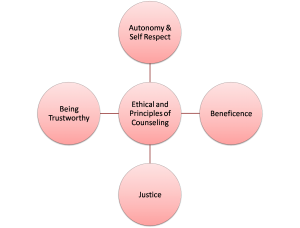What is Virtual Counseling?
Virtual counseling is the delivery of counseling and therapeutic session between the counselor and patients via the computer and technology.
Benefits and Challenges
There are many benefits and challenges of online counseling [1], as describe below:
Benefits:
- Convenience and remote access.Clients/Students who are reluctant to meet a counselor in person can use virtual counseling to seek help. There is no geographical and time zones boundaries.
- Privacy There are many people have a problem to see a counselor in person because they are shy, phobia, or afraid. Thus by using virtual counseling, it could give more privacy to the clients.
- Honest and straight forward.In online counseling, clients will be straight forward because they know that the session is private and nobody know who are them.
Challenges:
- Counselor might not be able to protect or avoid clients from any physical risks.For some cases it will be better to served them offline or in person such as victims of abuse, clients with suicidal risks, or the clients with urgent crisis.
- Trust and Confidence.Both clients and counselor must have trust and confidence on each other to ensure the counseling session works well. Confidentiality and security are big issues in online counseling.
Ethical and Principles
The ethical and principles of counseling is shown below [2]:
Application to TrustPal
TrustPal is a virtual counseling platform that will be developed to support the University of Southampton students virtually and anonymously. When we found about the Nightline, we believe there are students who really needs the support and advise but they feel afraid to meet the counselor. Thus, TrustPal is a good platform for them. TrustPal is a convenience and can be accessed across places and platform, regardless where the student is.In TrustPal, we are applying the ethical and principles of counseling. For example, TrustPal will guarantee the student’s privacy is under control, being trustworthy, respect the user, beneficence, and avoid any judgmental or injustice issue.
Resources
[1] C. Spayer, J. Zack (2010). Online Counseling: Beyond the Pros and Cons.
[2] British Association for Counseling and Psychotherapy (2002). Ethical Framework for Good Practice in Counseling and Psychotherapy.

